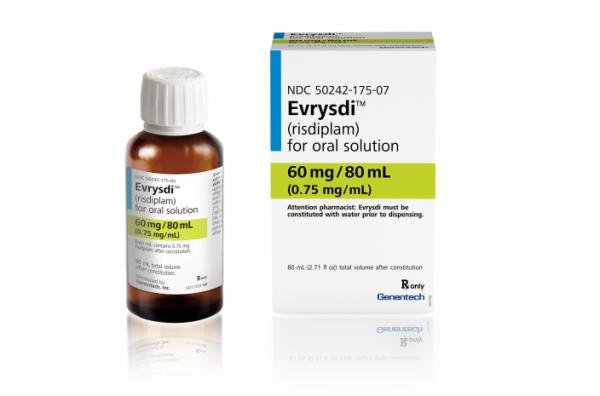Risdiplam Side Effects
Applies to risdiplam: oral powder for solution.
Precautions
It is very important that your doctor check your child's progress at regular visits to make sure this medicine is working properly. Blood tests may be needed to check for unwanted effects.
Using this medicine while you are pregnant can harm your unborn baby. If you are a woman who can bear children, your doctor may give you a pregnancy test before you start using this medicine to make sure you are not pregnant. Use an effective form of birth control during treatment and for at least 1 month after the last dose.
If you plan to have children, talk with your doctor before using this medicine. Some men using this medicine have become infertile (unable to have children).
Do not take other medicines unless they have been discussed with your doctor. This includes prescription or non-prescription (over-the-counter [OTC]) medicines and herbal or vitamin supplements.
Serious side effects of risdiplam
Along with its needed effects, risdiplam may cause some unwanted effects. Although not all of these side effects may occur, if they do occur they may need medical attention.
Check with your doctor immediately if any of the following side effects occur while taking risdiplam:
More common side effects
Less common side effects
- bladder pain
- bloody or cloudy urine
- difficult, burning, or painful urination
- frequent urge to urinate
- lower back or side pain
Other side effects of risdiplam
Some side effects of risdiplam may occur that usually do not need medical attention. These side effects may go away during treatment as your body adjusts to the medicine. Also, your health care professional may be able to tell you about ways to prevent or reduce some of these side effects.
Check with your health care professional if any of the following side effects continue or are bothersome or if you have any questions about them:
More common side effects
- canker sores
- constipation
- diarrhea
- skin rash
- sores, ulcers, or white spots on the lips or tongue or inside the mouth
- vomiting
Less common side effects
- difficulty in moving
- joint pain
- muscle pain or stiffness
See also:
For healthcare professionals
Applies to risdiplam: oral powder for reconstitution, oral tablet.
General adverse events
The most frequently reported side effects included fever, diarrhea, headache, and rash. Additionally, among patients with infantile-onset spinal muscular atrophy, upper respiratory tract infection, lower respiratory tract infection, constipation, vomiting, and cough were reported.[Ref]
Dermatologic
- Very common (10% or more): Rash (up to 17%)
- Common (1% to 10%): Eczema
- Postmarketing reports: Cutaneous vasculitis
Rash included dermatitis, rash, erythema, maculo-papular rash, erythematous rash, popular rash, allergic dermatitis, acneiform dermatitis, and folliculitis.
Cutaneous vasculitis was identified during post-marketing experience.
Endocrine
- Common (1% to 10%): Cryptorchism
Gastrointestinal
- Very common (10% or more): Constipation (up to 25%), diarrhea (up to 17%), vomiting (up to 17%)
- Common (1% to 10%): Mouth and aphthous ulcers, gastroesophageal reflux disease, gastroenteritis, nausea, upper abdominal pain
Genitourinary
- Common (1% to 10%): Urinary tract infection
Urinary tract infection included urinary tract infection and cystitis.
Musculoskeletal
- Common (1% to 10%): Arthralgia, joint dislocation
Nervous system
- Very common (10% or more): Headache (20%)
Other
- Very common (10% or more): Pyrexia (up to 54%), teething (up to 13%)
- Common (1% to 10%): Ear infection
Pyrexia included fever and hyperpyrexia.
Respiratory
- Very common (10% or more): Upper respiratory tract infection (up to 82%), pneumonia (up to 40%), cough (12.9%), bronchitis (up to 11%)
- Common (1% to 10%): Respiratory failure, respiratory distress, acute respiratory failure, atelectasis
- Frequency not reported: Lower respiratory tract infection
Upper respiratory tract infections included nasopharyngitis, respiratory tract infection, rhinitis, influenza, pharyngitis, viral respiratory tract infection, upper respiratory tract infection (bacterial and viral), and COVID-19.
Lower respiratory tract infection included pneumonia and bronchitis.
References
1. (2020) "Product Information. Evrysdi (risdiplam)." Genentech
2. (2024) "Product Information. Evrysdi (risdiplam)." Genentech
3. (2023) "Product Information. Evrysdi (risdiplam)." Roche Products Pty Ltd
4. (2023) "Product Information. Evrysdi (risdiplam)." Roche Products Ltd
More about risdiplam
- Check interactions
- Compare alternatives
- Dosage information
- During pregnancy
- Drug class: miscellaneous uncategorized agents
- En español
Patient resources
Other brands
Professional resources
Other brands
Related treatment guides
Further information
Risdiplam side effects can vary depending on the individual. Always consult your healthcare provider to ensure the information displayed on this page applies to your personal circumstances.
Note: Medication side effects may be underreported. If you are experiencing side effects that are not listed, submit a report to the FDA by following this guide.

